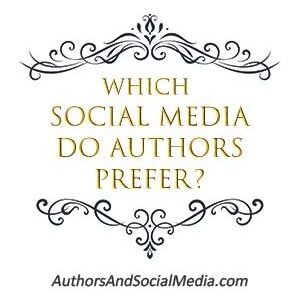Which Social Media Do Authors Prefer? Exploring Platforms for Writers
 Social media has become a cornerstone for authors to market their books, connect with readers, and build their brands. However, with multiple platforms available, you might be wondering: Which social media do authors prefer?
Social media has become a cornerstone for authors to market their books, connect with readers, and build their brands. However, with multiple platforms available, you might be wondering: Which social media do authors prefer?
The answer can vary depending on an author’s goals, genre, and personality, but a few platforms consistently stand out. This article explores the social media platforms authors prefer most. It’s part of our guide about authors and social media, created by a former literary agent.
Here’s what you’ll find inside:
- Definition of Social Media by Authors
- Do Authors Need Social Media?
- Social Media Marketing for Authors
- Social Media Strategy for Authors
- Author Social Media Ideas
- Social Media Calendar for Authors
- Social Media Marketing Services for Authors
- Social Media Manager for Authors
Best Social Media Platform for Authors
-
Twitter (X)
Twitter remains a favorite among authors, particularly those in fiction and nonfiction.
- Why Authors Prefer It:
- Real-time interaction with readers and peers.
- Vibrant writing communities under hashtags like #WritingCommunity and #AmWriting.
- A platform for quick updates, snippets, and discussions.
- Best For:
- Networking with other writers and industry professionals.
- Sharing links to blog posts, articles, and book promotions.
- Participating in pitch contests like #PitMad.
- Example:
Authors like Neil Gaiman and Roxane Gay use Twitter to engage with their fans, share book updates, and discuss current events.
-
Instagram
Instagram is highly visual, making it ideal for authors who can creatively showcase their books and writing journey.
- Why Authors Prefer It:
- Eye-catching visuals like book covers, mood boards, and reading nooks.
- Features like Stories, Reels, and carousels for dynamic content.
- A large community of book lovers under hashtags like #Bookstagram.
- Best For:
- Young Adult (YA), romance, and fantasy authors who target visually-driven audiences.
- Sharing behind-the-scenes content, like workspaces or progress on manuscripts.
- Example:
Colleen Hoover frequently uses Instagram to connect with her readers and promote her bestsellers.
-
Facebook
Facebook’s diverse user base and features make it a reliable choice for many authors, particularly those targeting older demographics.
- Why Authors Prefer It:
- A platform for creating dedicated author pages and private groups.
- Long-form content like event announcements, book excerpts, and in-depth posts.
- Facebook Live for virtual book signings, Q&A sessions, and workshops.
- Best For:
- Authors of nonfiction, literary fiction, and historical genres.
- Building tight-knit communities and hosting book clubs.
- Example:
Nonfiction author Brené Brown leverages Facebook to share meaningful content and promote her books.
-
TikTok
TikTok has surged in popularity, especially among Young Adult (YA) authors, thanks to the #BookTok community.
- Why Authors Prefer It:
- Short, engaging videos that attract younger audiences.
- Viral trends and challenges that boost visibility.
- Direct sales impact for books that go viral under hashtags like #BookTok.
- Best For:
- YA, romance, and fantasy authors.
- Creating engaging content like character introductions, dramatic readings, or book recommendations.
- Example:
Authors like Madeline Miller (Circe) have seen their books gain massive traction through #BookTok.
-
LinkedIn
LinkedIn is ideal for authors of nonfiction, business, and self-help books who want to establish themselves as thought leaders.
- Why Authors Prefer It:
- A professional audience for sharing expertise and insights.
- Long-form articles and posts to discuss industry trends or book topics.
- Networking with professionals for collaborations and speaking opportunities.
- Best For:
- Nonfiction and self-help authors targeting professionals and executives.
- Example:
Simon Sinek uses LinkedIn to promote his leadership books and share insights with a professional audience.
-
Pinterest
Though less interactive than other platforms, Pinterest’s visual focus makes it a unique tool for authors.
- Why Authors Prefer It:
- Creating boards for book aesthetics, character designs, or plot inspiration.
- Sharing writing tips, infographics, and book reviews.
- Best For:
- Fantasy, romance, and lifestyle authors.
- Example:
Authors use Pinterest to create visual representations of their stories, attracting readers who enjoy exploring aesthetics.
Factors Influencing an Author’s Social Media Choice
- Genre and Target Audience:
- YA authors gravitate toward Instagram and TikTok, while nonfiction authors find LinkedIn more effective.
- Personal Style:
- Visual storytellers may prefer Instagram, while those comfortable with quick, conversational updates lean toward Twitter.
- Goals:
- Authors focused on professional networking may prioritize LinkedIn, while those aiming for reader engagement might choose Instagram or Facebook.
- Demographics:
- Platforms like TikTok cater to younger readers, while Facebook is popular with older audiences.
Which Social Media Platform Is Best for Authors?
Which social media do authors prefer? The best platform depends on the author’s goals and audience. Instagram and TikTok are great for visual storytelling, while Twitter excels at networking and real-time updates.
Are Some Platforms Better for Certain Genres?
Absolutely. For example, romance and fantasy authors often thrive on TikTok because of the #BookTok community. Nonfiction authors, especially in self-help or business, do well on LinkedIn. Instagram’s visual nature is great for showcasing book covers and aesthetics, while Facebook is ideal for building reader groups. Knowing your genre’s audience is key to choosing the right platform.
Should Authors Join Every New Social Media Platform as It Emerges?
Not necessarily. It’s better to excel on one or two platforms than spread yourself thin. However, keep an eye on emerging trends—platforms like TikTok have quickly become powerful for authors. If a new platform aligns with your audience, it’s worth exploring.
Conclusion – Which Social Media Do Authors Prefer?
While platforms like Instagram and TikTok are thriving among younger, visually-driven audiences, Twitter and Facebook continue to be reliable options for networking and community building. By understanding your audience, leveraging the strengths of each platform, and maintaining a consistent presence, social media can become a powerful tool in your authorial toolkit.
If you’ve been wondering which social media do authors prefer, start experimenting today and find the platform that best aligns with your goals and style. Now that you’ve read “Which Social Media Do Authors Prefer?” click here for the next article in this guide to social media for authors, “Definition of Social Media by Authors.”

 This guide about
This guide about 